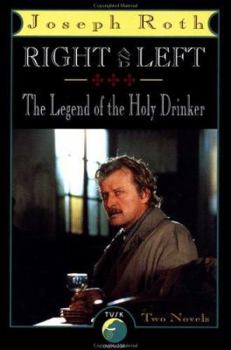Right and Left and the Legend of the Holy Drinker
Select Format
Select Condition 
Book Overview
With tragic foresight, Right and Left, first published in 1929, evokes the nightlife, corruption, political unrest, and economic tyranny of Berlin in the twenties, the same territory covered... This description may be from another edition of this product.
Format:Paperback
Language:English
ISBN:0879514566
ISBN13:9780879514563
Release Date:June 1993
Publisher:Overlook Press
Length:304 Pages
Weight:0.73 lbs.
Dimensions:1.0" x 5.0" x 8.0"
Customer Reviews
2 ratings
Don't Get Stuck in the Middle
Published by Thriftbooks.com User , 15 years ago
The English title - Right and Left - of Joseph Roth's 1929 novel 'Rechts und Links' almost automatically suggests a clash between furious Fascism and surly Bolshevism, but such is not the case in this oddly-inconclusive narrative. Roth's subject is the precarious middle -- the haplessly middling Middle Class of Middle Europe amid the false peace between the two World Wars. The three principal characters are also stuck in the middle between Jewish and 'German' identities, being of 'mixed' blood. Two brothers, Paul and Theodore Bernheim, with a German father and a guardedly Jewish mother, are the anti-protagonists of the novel. Dashing Paul is full of arrogant mediocrity, with a middling measure of charm and the luck of a bottle thrown in the sea with a note in it; it WILL wash ashore somewhere, but the message turns out to be blank. Snarly Theodore is full of mediocre arrogance compounded with raging sibling-envy and self-hatred; half Jewish, he first clings to Brown Shirt anti-semitic nationalism for an identity fix, then finds himself suborned as a journalist-provocateur for a 'liberal' newspaper. The closeted owner of the newspaper is Nikolai Brandeis, a stateless immigrant who has by his own account already lived the lives of three different people. Brandeis is not so much unscrupulous as aloof from scruples; for such a man, getting rich is simply a choice. He is also, metaphorically, the stroller on the beach who snatches Bottle Paul from the waves and reads the blank page. Brandeis arrives on the scene at the end of Part One of this three-part book, and his appearance rescues both the brothers and the reader from drift. Brandeis is a fascinating character, and interesting characters make interesting reading. It's a literary weakness of this novel that it starts so slowly, that it spends more time than necessary establishing the mediocrity of the brothers. Yes, of course, middling characters must be given middling flaws and suffer middling crises, but for the first time in my experience of reading Joseph Roth I found that I doubted whether he knew where his novel was going next. I'd almost admitted boredom when Brandeis materialized. Brandeis is effectively The Wandering Jew of European imagination, an 'immortal' outsider who re-invents himself at will. All three chief characters are immensely convincing, by the way, and that in itself is enough to rescue 'Right and Left' from novelistic mediocrity. Don't expect to empathize with anyone in this book -- or if you do, take a quick look in the mirror and despair for your life! Roth's treatment of the milieu is bitterly satirical, not unlike that of Sinclair Lewis writing about Main Street America in the same decade. It may be another weakness of the novel that Roth so obviously despises his creatures of imagination, but then how could one not despise such human hollowness? Roth's ruthless sallies of satire are amusing without being funny, but how can one laugh at an entire society slouching t
what I first wrote..
Published by Thriftbooks.com User , 18 years ago
The Legend Of The Holy Drinker, Ermano Olmi's film of which won a Palme D'Or in Venice two years ago, was Joseph Roth's final work. He died, a chronic alcoholic, down on his luck at 44, just as the second world war began. A Jew, who was buried a Catholic, he turned from republican radical into an inebriate waver of the Habsburg flag. Michael Hoffman, who after a somewhat pedantic first paragraph translates the work elegantly, says that Roth advanced a sophisticated argument that while drink shortened his life in the medium term, it kept him alive in the short term. Roth spent his last year in an attic room so tiny he could fall out of bed straight into the corridor and roll downstairs to the bar. The 50-page novella describes a miraculous time in the life of Andreas Kartak, a man who has led a precarious existence sleeping under the bridges of the Seine. Innocent and saintly, in the manner of Peter Sellers in Being There, he finds himself on the receiving end of money, drink, love and friendship. It's a moving miniature ode to dipsomania rather than Bacchus. Take away the miracles and you'll hear it being sung on London's Embankment. While Roth's work may not qualify him for the legendary status of his great contemporaries, Mann and Musil, his life surely would.





